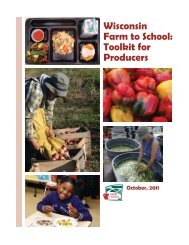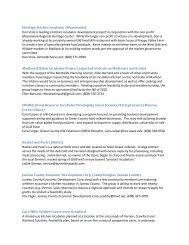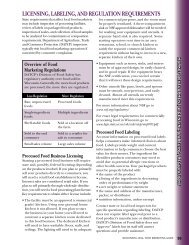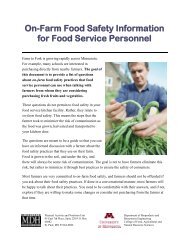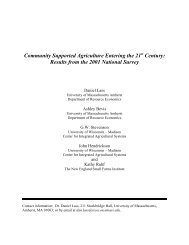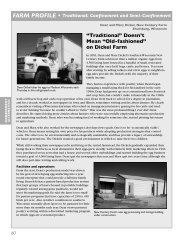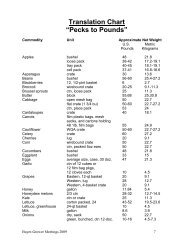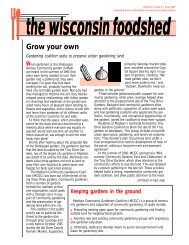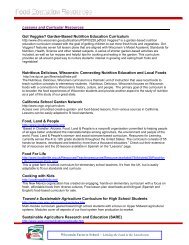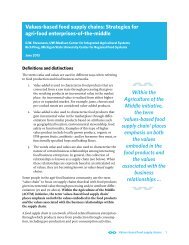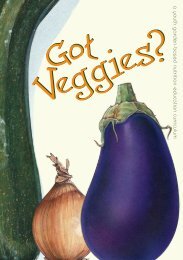Poultry Your Way - Center for Integrated Agricultural Systems ...
Poultry Your Way - Center for Integrated Agricultural Systems ...
Poultry Your Way - Center for Integrated Agricultural Systems ...
You also want an ePaper? Increase the reach of your titles
YUMPU automatically turns print PDFs into web optimized ePapers that Google loves.
MANAGEMENT<br />
ALTERNATIVES<br />
84<br />
<strong>Poultry</strong> <strong>Your</strong> <strong>Way</strong><br />
MANAGEMENT ALTERNATIVES<br />
ORGANIC<br />
Organic Management Overview<br />
Birds: Conventional day-old chicks, all species and breeds<br />
Land: Outdoor access (land must be organic)<br />
Housing: Semi-confinement or pasture<br />
Stocking density: Sufficient room <strong>for</strong> natural behavior<br />
Equipment: Electric fencing, poultry netting, feed troughs, water fountains<br />
Labor: Recordkeeping, communicating with customers, plus flock labor as outlined<br />
<strong>for</strong> other management systems<br />
Operation: Year-round<br />
Advantages: Market premiums <strong>for</strong> products; environmentally friendly; endorsed by<br />
animal welfare advocates<br />
Disadvantages: Recordkeeping; regulated management practices; higher feed costs<br />
Birds and Per<strong>for</strong>mance. Organic managers who do not breed and hatch their own chicks may purchase dayold<br />
birds from conventional breeding stock. Only day-old chicks are exempted from organic certification; if you’re<br />
anxious to get your laying flock started, and wish to purchase pullets or other immature birds, they will have to be<br />
certified organic. Some hatcheries do rear birds from organic breeding stock out of principle. Coon Creek Family<br />
Farm in Mondovi, Wisconsin, <strong>for</strong> example, has a small breeding flock of pasture-reared organic CornDel broilers.<br />
The hatchlings are not certified organic, but come from parent stock that is fed an organic ration. Coon Creek<br />
Family Farm is listed in Resources under Hatcheries.<br />
Regardless of where you purchase your birds, breed selection will be vitally important under the organic<br />
management system. National Organic Standards prohibit the use of conventional medicines and treatments<br />
unless the birds’ welfare is at risk. For this reason, organic producers are beginning to search <strong>for</strong> hardy breeds that<br />
are more disease resistant and weather tolerant. Some growers have used the Kosher King chicken <strong>for</strong> broiler<br />
production, though on-farm trials have not shown them to be any better than the standard Cornish Cross <strong>for</strong><br />
pasture-based organic production (Franczyk, 2002).<br />
Pasture. According to the National Organic Standards, poultry producers seeking organic certification must<br />
provide their flocks with “living conditions which accommodate the health and natural behavior of animals”<br />
(Section 205.239, Livestock Living Conditions. National Organic Program, USDA). For some, this signifies access<br />
to well-managed pasture, while <strong>for</strong> others, this means a simple yard where birds can scratch in the sunlight.<br />
In truth, the NOP language is somewhat vague and subject to interpretation by certifiers. Cate Irsfeld-Eddy, a<br />
certification staff member with the Midwest Organic Services Association (MOSA) in Wisconsin, interprets the<br />
NOP language to mean:<br />
• Pasturing is NOP-compliant but not required.<br />
• Outdoor access yards with minimum plant cover are NOP-compliant.<br />
• Outdoor cement yards are not NOP-compliant.<br />
Although the NOP rules do not require poultry (including waterfowl and captive wild game birds) to <strong>for</strong>age on<br />
pasture, many organic poultry farmers turn their birds out on pasture <strong>for</strong> six months or more each year. They<br />
argue that this type of outdoor access more closely mimics birds’ natural behavior than would time spent in an<br />
enclosed dirt yard.<br />
If your organic plan includes the use of pasture or range <strong>for</strong> your birds, you will need to follow the National<br />
Organic Standards <strong>for</strong> pasture seeding and maintenance. The standards state that you must use certified organic<br />
seed (where available) and “approved practices or materials” to control weeds. Consult section 205.206 in the<br />
National Organic Standards <strong>for</strong> the list of approved fertilizer, weed and pest control practices and materials.



